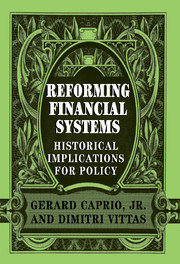Book contents
- Frontmatter
- Contents
- List of contributors
- Foreword
- 1 Financial history: Lessons of the past for reformers of the present
- 2 The evolution of central banking
- 3 Free banking: The Scottish experience as a model for emerging economies
- 4 Regulation and bank stability: Canada and the United States, 1870–1980
- 5 Deposit insurance
- 6 Contingent liability in banking: Useful policy for developing countries?
- 7 Universal banking and the financing of industrial development
- 8 Before main banks: A selective historical overview of Japan's prewar financial system
- 9 Thrift deposit institutions in Europe and the United States
- 10 The development of industrial pensions in the United States during the twentieth century
- 11 The rise of securities markets: What can government do?
- Index
1 - Financial history: Lessons of the past for reformers of the present
Published online by Cambridge University Press: 25 March 2010
- Frontmatter
- Contents
- List of contributors
- Foreword
- 1 Financial history: Lessons of the past for reformers of the present
- 2 The evolution of central banking
- 3 Free banking: The Scottish experience as a model for emerging economies
- 4 Regulation and bank stability: Canada and the United States, 1870–1980
- 5 Deposit insurance
- 6 Contingent liability in banking: Useful policy for developing countries?
- 7 Universal banking and the financing of industrial development
- 8 Before main banks: A selective historical overview of Japan's prewar financial system
- 9 Thrift deposit institutions in Europe and the United States
- 10 The development of industrial pensions in the United States during the twentieth century
- 11 The rise of securities markets: What can government do?
- Index
Summary
History teaches nothing, only punishes those who do not learn its lessons. Charles Maurice de Talleyrand-Périgord (1754–1838)
Financial systems in many developing and transitional economies are in a state of flux, in many instances emerging from periods of significant repression and more recent episodes of financial reforms, with little to show for the changes. Indeed, financial crises or more silent forms of financial distress appear to be widespread, from Argentina, Mexico, and Venezuela, to many countries in Eastern Europe and the former Soviet Union, to those in Africa and parts of Asia. For a variety of reasons, financial reforms are difficult to manage, as they involve changing incentive systems and institutions. Also, finance – in particular, banking, the heart of developing and transitional economies' financial systems – is different from other sectors or industries in that failures can spread in a contagious fashion from one institution to another, with deleterious effects on the rest of the economy. And in part as an effort to cope with contagion, some or all of the liabilities of banks often carry an implicit or explicit government guarantee, creating a problem of moral hazard.
In addition, a major difficulty with attempts to reform finance, whatever the initial conditions, is that the reformers virtually always take as given the goal, namely, to move their financial systems toward the general model that has been adopted in most OECD countries today. This model, to the extent that one can generalize, is based on a safety net, in the form of government “insurance” for deposits, a prescribed minimum capital adequacy ratio, and government supplied supervision.
- Type
- Chapter
- Information
- Reforming Financial SystemsHistorical Implications for Policy, pp. 1 - 21Publisher: Cambridge University PressPrint publication year: 1997
- 1
- Cited by



